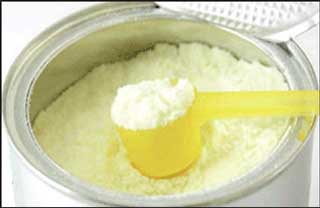Tuesday Feb 17, 2026
Tuesday Feb 17, 2026
Friday, 31 December 2021 00:00 - - {{hitsCtrl.values.hits}}
By Charumini de Silva
 The prices of imported milk powder have been increased for the second time since October, a move justified by the trade but scorned by consumers.
The prices of imported milk powder have been increased for the second time since October, a move justified by the trade but scorned by consumers.
According to the Milk Powder Importers’ Association, a 1 kg packet of milk powder has been increased by Rs. 150 to Rs. 1,345 and the price of 400 g packet by Rs. 60 to Rs. 540.
In August, the Government decided to abolish taxes amounting to Rs. 175 on milk powder to prevent an upward revision in prices, but with yesterday’s upward price revision, the prices were increased twice just within two months – 1 kg packet by Rs. 400 and 400 g packet by Rs. 160.
“During the past eight weeks, the global milk powder prices increased sharply. We can no longer supply milk powder without increasing the prices; if so, our companies will not be able to sustain the businesses,” Milk Powder Importers’ Association members told the Daily FT. Previously, the price revision was made on 10 October. The 1 kg packet of milk powder was increased from Rs. 945 to Rs. 1,195 and the 400 g packet from Rs. 380 to Rs. 480. The steep price increase in milk powder has caused much debate and anger amongst consumers.
“At a time when people are reeling under the cost of living and battered by the impacts of COVID pandemic, every increase in the additional budget of a household becomes intolerable,” they lamented.
On 7 October, a special Cabinet meeting chaired by President Gotabaya Rajapaksa took the decision to revoke the existing Maximum Retail Price (MRP) on full-cream milk powder.
Later, the Consumer Protection State Minister justified the relaxation of the MRP on the basis of ensuring uninterrupted supplies and avoiding financial difficulties for manufacturers.
The Full Cream Milk Powder (FCMP) industry caters to 80% of the country’s consumption. Dairy products’ imports in the first 10 months of this year have increased by 15% to Rs. 58 billon, and in dollar terms by 7% to $ 294 million from the corresponding period of last year.
Consumer groups were angry over the latest hike.
“We have been in long queues for days and weeks now to get a packet of milk powder, but we had to go home empty handed. We can survive drinking water, but how can our children bear it?” they argued.
“We are battered by both price and supply constraints. We neither have the price benefit nor the supply. It is crystal clear that these policies are made to protect and ensure sustainability of companies and politicians, and definitely not to protect the consumers,” they charged.
Early this month, Finance Minister Basil Rajapaksa said the Government would have to curtail imports of milk powder, vehicles and State sector recruitments, following the depleting foreign reserves.
“If we can stop the imports of milk powder from next year, it will be a great help to save a large sum of foreign exchange. If we still have to import milk powder, then we will have to stop another essential item,” he said, adding that 2022 is a critical year for Sri Lanka in terms of foreign exchange situation.